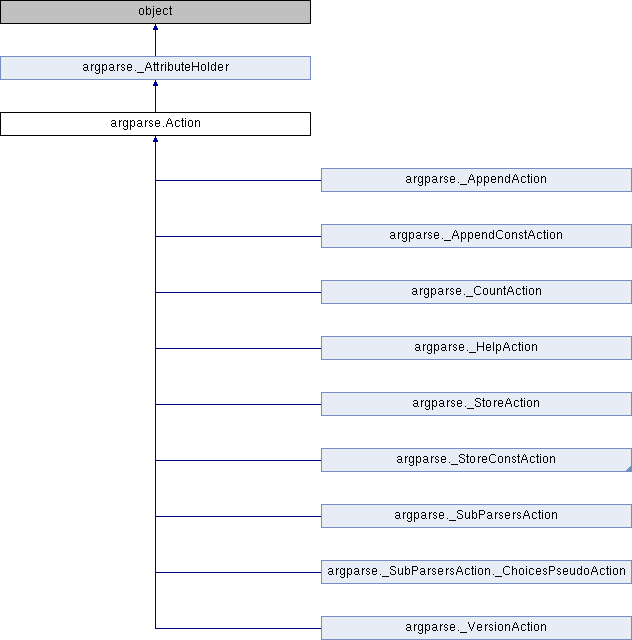argparse.Action Class Reference
Inheritance diagram for argparse.Action:

Public Member Functions | |
| def | __init__ |
| def | __call__ |
 Public Member Functions inherited from argparse._AttributeHolder Public Member Functions inherited from argparse._AttributeHolder | |
| def | __repr__ |
Public Attributes | |
| option_strings | |
| dest | |
| nargs | |
| const | |
| default | |
| type | |
| choices | |
| required | |
| help | |
| metavar | |
Detailed Description
Information about how to convert command line strings to Python objects.
Action objects are used by an ArgumentParser to represent the information
needed to parse a single argument from one or more strings from the
command line. The keyword arguments to the Action constructor are also
all attributes of Action instances.
Keyword Arguments:
- option_strings -- A list of command-line option strings which
should be associated with this action.
- dest -- The name of the attribute to hold the created object(s)
- nargs -- The number of command-line arguments that should be
consumed. By default, one argument will be consumed and a single
value will be produced. Other values include:
- N (an integer) consumes N arguments (and produces a list)
- '?' consumes zero or one arguments
- '*' consumes zero or more arguments (and produces a list)
- '+' consumes one or more arguments (and produces a list)
Note that the difference between the default and nargs=1 is that
with the default, a single value will be produced, while with
nargs=1, a list containing a single value will be produced.
- const -- The value to be produced if the option is specified and the
option uses an action that takes no values.
- default -- The value to be produced if the option is not specified.
- type -- A callable that accepts a single string argument, and
returns the converted value. The standard Python types str, int,
float, and complex are useful examples of such callables. If None,
str is used.
- choices -- A container of values that should be allowed. If not None,
after a command-line argument has been converted to the appropriate
type, an exception will be raised if it is not a member of this
collection.
- required -- True if the action must always be specified at the
command line. This is only meaningful for optional command-line
arguments.
- help -- The help string describing the argument.
- metavar -- The name to be used for the option's argument with the
help string. If None, the 'dest' value will be used as the name.
Definition at line 714 of file argparse.py.
The documentation for this class was generated from the following file:
- otsdaq_utilities/tools/argparse.py
